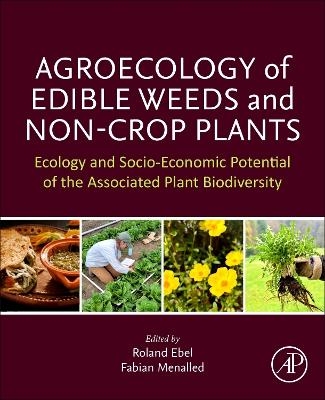
Agroecology of Edible Weeds and Non-Crop Plants
Academic Press Inc (Verlag)
978-0-443-16076-9 (ISBN)
Roland Ebel has a Ph.D. in Organic Farming, from the University of Natural Resources and Life Sciences, Vienna His MS in horticulture about the globe artichoke was conducted at the Technical University Munich. Dr. Ebel contributed to the construction of the Intercultural Maya University of Quintana Roo with an emphasis on traditional Mesoamerican farming and participatory research, including “quelites, associated edible and underutilized plants in traditional agroecosystems. He has worked at the Autonomous University of the State of Mexico and taught an online Agroecology course for the University of Massachusetts. He served as a Post-Doc at Montana State University (MSU), developing an adaptable Sustainable Food Systems curriculum, and was appointed Assistant Research Professor there teaching an Ethnobotany undergraduate course, among others. His research focuses on biofertilizers made of food residues, local food systems and their responses to shocks, as well as underutilized plants. Dr. Menalled is a Professor in Weed Ecology and Sustainable Agriculture at Montana State University (MUS). He received a BS in Biology at the University of Buenos Aires, Argentina, and a Ph.D. in Forest Ecology at the University of Massachusetts, Amherst, while conducting agroforestry research at the Biological Station La Selva, Costa Rica. His research and education program at MSU focuses on understanding the ecological underpinnings of sustainable cropping systems. This program embraces a multi-disciplinary approach to address both basic and applied problems facing the agricultural communities. Core areas of research include 1) Patterns and functional importance of the associated biodiversity in conventional and alternative cropping systems, 2) Assessment of multi-trophic pest management interactions in agroecosystems, and 3) Development of integrated weed management practices. As main author or co-author, Dr. Menalled published 114 peer-revied articles, 15 book chapters, two books, and more than 160 technical bulletins and popular press articles.
1 Ecological principles in the study of edible weeds
2 Are we fighting our coevolutionary partners?
3 Developing ecological and socioeconomic criteria to diversify weed use for food
4 Impacts of edible weeds on other components of the associated biodiversity
5 Edible weeds as crops
6 Edible weeds as a component of a resilient food system
7 Weeds as a social construct
8 The economy of edible weeds: evidence and conceptual framework
9 Teaching edible weeds in higher education: examples from Montana State University’s sustainable food systems program
10 Edible exotic weeds for food security and food sovereignty in NW Patagonia
11 “Quelites”: the culture of edible weeds in Mexico
12 Descurainia sophia (flixweed): a weed with many uses and ecological roles
13 Itajetik: Agroecology and food culture of edible noncrop plants of the Tseltal Maya in northern Chiapas
14 Food beyond the farm: significance of noncrop plants and mushrooms for food security of highland farming communities in Veracruz, Mexico
15 Agroecology of edible weeds in India
16 Epilogue: Harnessing the diversity of our fields. Lessons that edible weeds can teach us
| Erscheinungsdatum | 28.09.2024 |
|---|---|
| Verlagsort | San Diego |
| Sprache | englisch |
| Maße | 191 x 235 mm |
| Gewicht | 450 g |
| Themenwelt | Naturwissenschaften ► Biologie ► Botanik |
| Naturwissenschaften ► Biologie ► Ökologie / Naturschutz | |
| Technik ► Lebensmitteltechnologie | |
| Weitere Fachgebiete ► Land- / Forstwirtschaft / Fischerei | |
| ISBN-10 | 0-443-16076-7 / 0443160767 |
| ISBN-13 | 978-0-443-16076-9 / 9780443160769 |
| Zustand | Neuware |
| Informationen gemäß Produktsicherheitsverordnung (GPSR) | |
| Haben Sie eine Frage zum Produkt? |
aus dem Bereich


